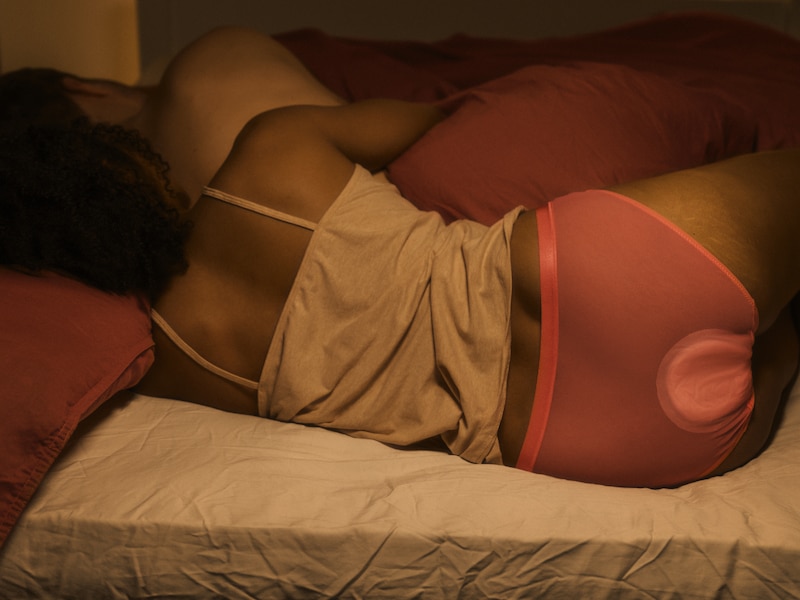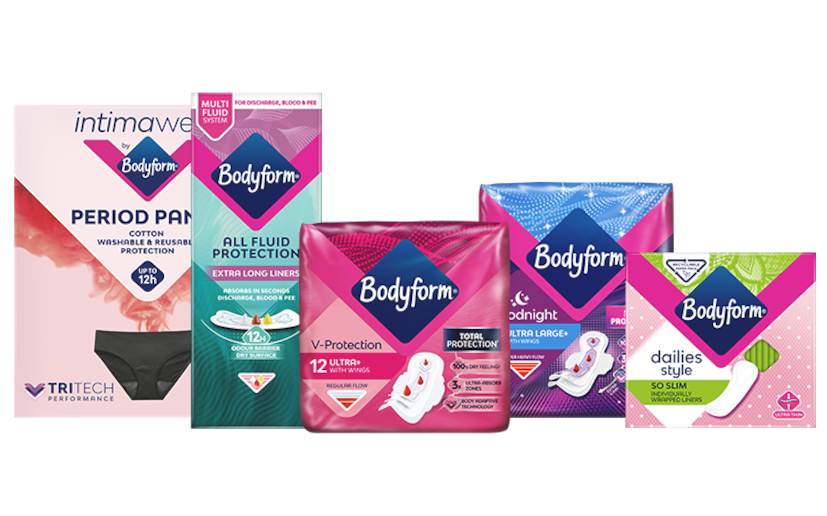Period insomnia: why is it so hard to sleep during your period?

A lot goes on around our menstruation – from cramping and mood changes to restlessness. That’s right, most of us have been there: tossing and turning the nights before and during our period hoping to catch at least a little shuteye. But just because periods don’t sleep, why shouldn’t we?
If you've ever suffered from insomnia during (or even before) your period, you know how frustrating it is. You're tired, your head feels clouded and you can't fall asleep… or you wake up at night then it’s impossible to return to your dreams. Well, it turns out that disturbed sleep is a pretty common symptom, along with the period pain and mood swings many of us are used to. The good news is that understanding the reasons behind period insomnia can lead us to some ways around it. So, let’s dive in...
Reasons you can’t sleep on your period
There are many culprits when it comes to sleepless period nights. Let’s explore the reasons why you may be struggling to get the quality sleep you need during your period…
Premenstrual syndrome (PMS)
That’s right, period insomnia can start even before our flow arrives. During the PMS phase of the menstrual cycle, levels of the hormones progesterone and oestrogen drop. These fluctuations in hormone levels can make our abdomen feel bloated, our breasts tender, and give us —literal— headaches. These annoying symptoms can start as early as a week or only a few hours before our periods start. [1] And they don’t stop at night, making it hard to catch some sleep.
Hormonal changes
Every monthly menstrual cycle, our bodies go through different hormonal phases. During our menstrual phase, our melatonin levels fall, which is the hormone that regulates our sleep. [2] This messes with our deepest sleep cycle phase, known as Rapid Eye Movement (or REM), which impacts our overall quality of sleep at night.
Body temperature, night sweats, and hot flashes
Our body temperature can change throughout the menstrual cycle. During the ovulation phase, higher progesterone levels increase our body temperature, which remains higher for the next 2 weeks. [3] No wonder so many of us wake up in a puddle of sweat in the middle of the night!
If you feel a sudden, intense heat surge through your body while you’re trying to sleep, you may be experiencing hot flashes, which are also common among women+ experiencing perimenopause (the time leading up to menopause). The good news is they tend to last for only a few minutes until your body eventually returns to its normal temperature.
Sleep paralysis
A nasty side effect of getting little sleep can be sleep paralysis [4], which in turn gives us even further sleepless nights. Sleep paralysis is when you wake up and feel like you can’t move. Scary as it may sound, it is momentary and usually harmless, but it can certainly freak you out enough to not want to go back to bed.
If sleep paralysis does strike and you feel too anxious or scared to go to sleep because of it, it’s a good idea to reach out to a doctor. They will be able to suggest the right treatment and give you some reassurance so you may go back to your sweet dreams.
How to sleep better on your period
Because we’re all different, there’s not a single fix for period insomnia... it’s more of a trial-and-error process. But there a few tips and tricks you can experiment with to find what works best for you.
Try a relaxing bedtime routine
Sticking to a sleep routine even when you’re on your period can give you a good chance at feeling relaxed enough for bed. So, what to keep in mind? A good place to start is staying clear of screens. Playing a video game or scrolling on your phone in the hours before bed exposes you to blue light, which can disrupt your circadian rhythms by tricking your brain into thinking it’s still time to be awake [5]. So why not leave social media alone at the end of the day, and try winding down with a book in soft lighting instead?
Another thing to avoid at least 6 hours before bedtime, is caffeinated drinks, otherwise you’ll still feel switched on at night [6].
You may also want to throw into your bedtime routine taking a warm bath or shower before bed to regulate your body temperature [7], or even practising some deep breathing or meditation. Feelings of relaxation from a calm breathing exercise can be a soothing activity to help ensure a restful night.
Go on “do not disturb” mode
While most of us have a harder time getting into a deep sleep during our period, there’s no need to make it any more difficult than it already is! So make sure your phone is on silent to keep any notifications from disturbing your slumber. Consider also investing in blackout blinds (or at least a good sleep mask) and even some ear plugs to be extra safe. Just be careful you can still hear your alarm in the morning!
Get into a comfortable position to sleep on your period
Trying a few different sleeping positions (especially if you get cramps) can help fight that pesky period insomnia. Whether it’s the foetal position or child’s pose, giving them a shot can relieve the abdominal tension that leaves you tossing and turning.
If you wake up at night, take the opportunity to change up your sleeping position as this can help improve circulation, allowing you to go back to sleep more easily.
Have an orgasm
Orgasms make us feel good and the time around our periods is no exception! Not only can they reduce cramps, but they can also help you get a better night’s sleep. This is because orgasms release a mix of hormones that cause us to relax and fall asleep more easily. So why not set the mood and masturbate? Or if you have a partner and feel up to it, you could try having some period sex to get all those feel-good pain-relieving benefits!
Try out some light exercise before bed
Exercising during your period can help regulate your body’s natural clock, improving the quality of your sleep. Also, if you get period cramps, moving your body before bedtime may relieve some of the strain by relaxing your tummy muscles. The best part is it doesn’t have to be a complex workout! Even taking a short 10-minute walk is still a great option to help you get rid of any period insomnia later that evening.
Find the right night period products for you
Finding period products specially made for night-time use can give you the confidence to sleep the night away. Whether you’re into tampons, pads or period underwear, there’s a solution for everyone! For example, our Bodyform Goodnight Towels with Max Cour-VTM technology that adapt to you flow and to your body, so you can snooze in peace. Or you may want to try our intimawear by Bodyform period pants for up to 12 hours of undisturbed rest.
And if you tend to bleed a lot during the night, remember to look for products with high absorbency that are designed to take care of a heavy period flow.
When should I see a doctor about my period insomnia?
Many of us struggle to sleep during the menstrual phase of our cycles, some more than others – as annoying as it can be, it's all a part of living with periods. However, the next time you’re suffering from period insomnia, ask yourself — is it starting to impact your life and the way you live it? If the answer is yes, then it may be a good idea to see a medical professional. Reaching out for help can get your sleep schedule back on track and give you some much needed reassurance.
If you’d like to continue learning about period insomnia and the gender sleep gap, then discover our quest for sleep. Or why not find out about how to get rid of period cramps at night and how to manage night-time leaks?
Medical disclaimer
The medical information in this article is provided as an information resource only, and is not to be used or relied on for any diagnostic or treatment purposes. Please consult your doctor for guidance about a specific medical condition.
[References]
[1] Ozisik Karaman HI, Tanriverdi G, Degirmenci Y. Subjective sleep quality in premenstrual syndrome. Gynecol Endocrinol. 2012 Aug;28(8):661-4. doi: 10.3109/09513590.2011.650769. Epub 2012 Feb 8. PMID: 22316208.
[2] Costello RB, Lentino CV, Boyd CC, O'Connell ML, Crawford CC, Sprengel ML, Deuster PA. The effectiveness of melatonin for promoting healthy sleep: a rapid evidence assessment of the literature. Nutr J. 2014 Nov 7;13:106. doi: 10.1186/1475-2891-13-106. PMID: 25380732; PMCID: PMC4273450.
[3] Steward K, Raja A. Physiology, Ovulation And Basal Body Temperature. [Updated 2022 Jul 18]. In: StatPearls [Internet]. Treasure Island (FL): StatPearls Publishing; 2022 Jan-. Available from: https://www.ncbi.nlm.nih.gov/books/NBK546686/
[4] https://www.sleepfoundation.org/insomnia/pms-and-insomnia
[5] https://www.sleepfoundation.org/bedroom-environment/blue-light
[6] https://www.sleepfoundation.org/nutrition/caffeine-and-sleep
[7] https://www.sleepfoundation.org/sleep-hygiene/shower-before-bed
Continue learning





